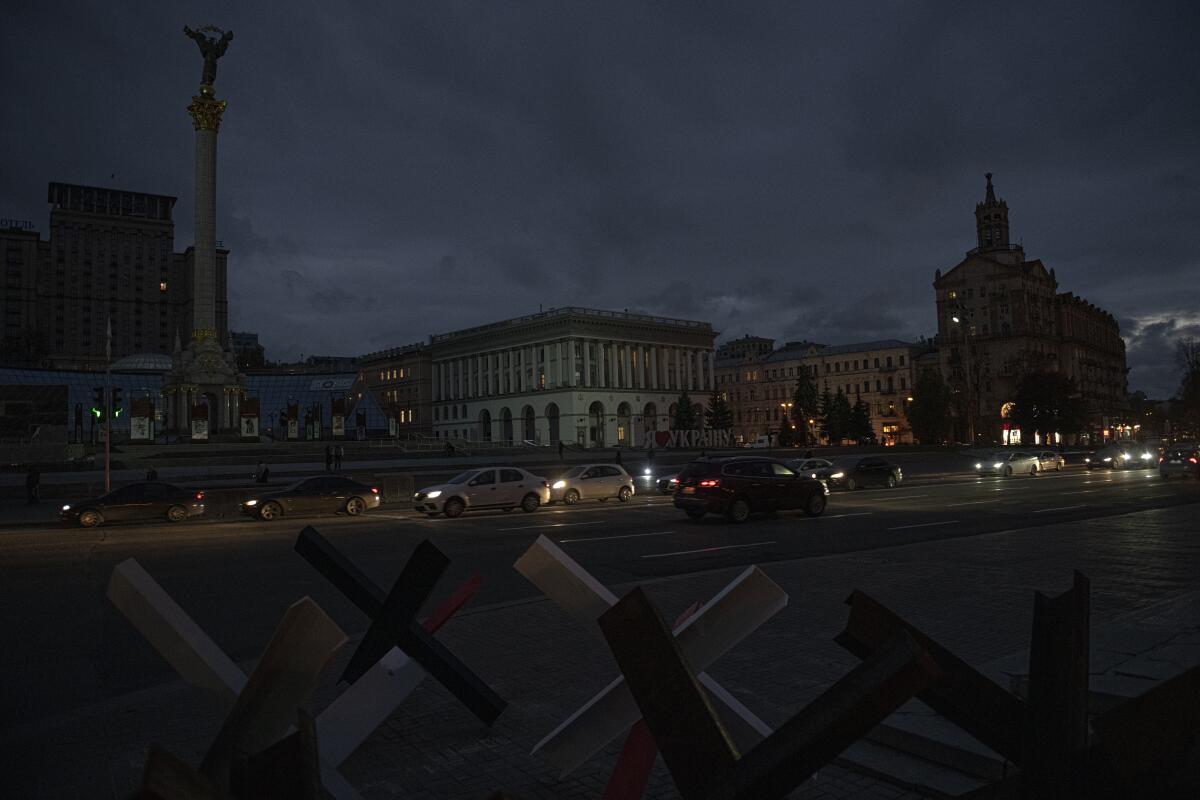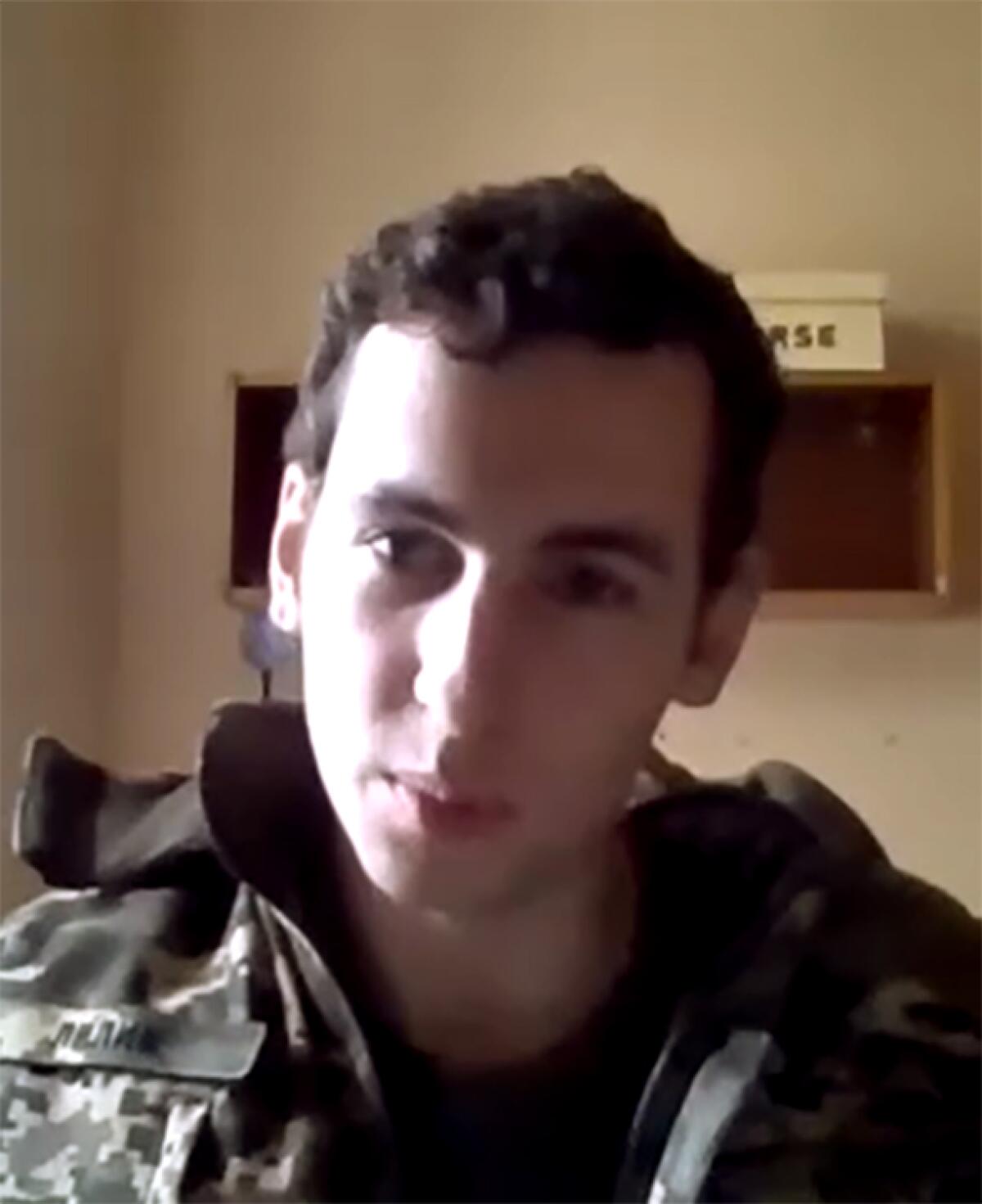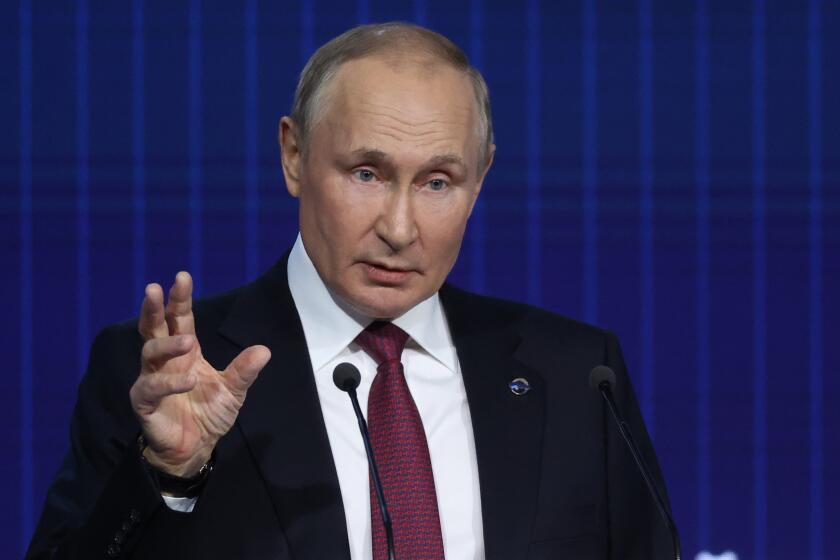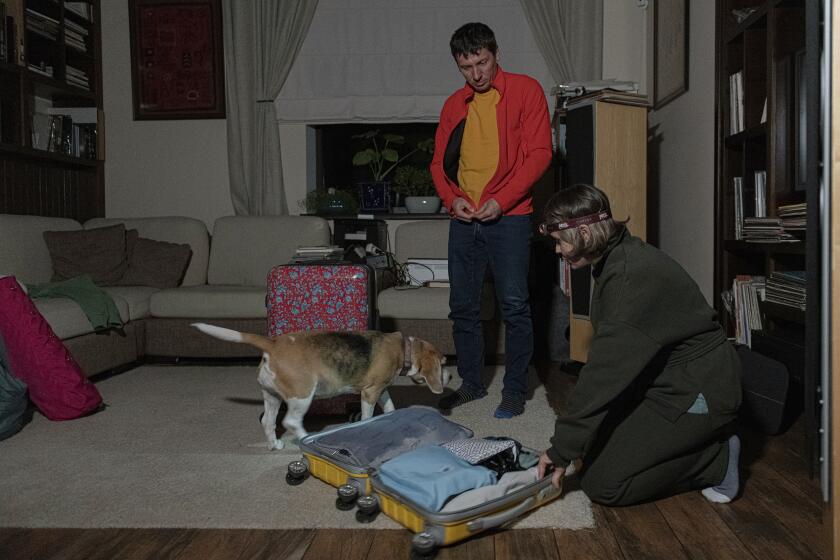Op-Ed: Kyiv’s answer to Putin’s drones is resistance and resilience

- Share via
Vitalii Lylyck, 21, was shaken but smiling when I reached him in his dorm room in Kyiv, just 10 days after Russian forces began sending low-flying drones to destroy infrastructure and terrorize Ukrainians far from the front lines. I had hoped to meet with him in person that week, but when the drones started flying he discouraged me from traveling to Kyiv so I remained in Poland and we spoke by Zoom instead.
He was wearing two coats but was still, as he put it, “chilled to the bone.” The dorm had had no heat for days, and although there was still electricity, Lylyck and his friends were using it as sparingly as possible. The students had eaten no hot food that week, living out of tin cans. When Vitalii and I spoke, they had running water. A week later, it too was cut, for a day, by the bombardment.
Putin knows his lies and talking points will get picked up by apologists and assets in the West, which the Russian state then feeds back to its own populace.
Conditions were “harsh,” Lylyck conceded. But he and his classmates at the Kyiv National University were unbowed. “We’re doing fine,” he said. “We’ve agreed among ourselves — after all the sacrifices our country has made this year, we don’t have the right to be gloomy. People have laid down their lives so we can live, and we’ve made a promise to ourselves: We won’t be sad this fall. Only Russians will be sad.”
George Orwell coined a term for courage like this. “No bomb that ever burst,” he wrote in Spain in 1939, “shatters the crystal spirit” — something he painted as precious and rare, found in one person in a million. In fact, in my experience working in the war zone, it’s anything but rare among Ukrainians — the midcareer professionals who enlist to fight on the front lines, the civilians who drive into artillery fire to deliver food and medicine or evacuate those who’ve lost everything, the white-collar refugees who take jobs as cleaners and cooks to feed their families in exile. Ukraine‘s military is winning on the battlefield, but civil society is also waging war, bravely and steadfastly doing its part to help the nation prevail.
The latest Russian assault — constant pummeling by Iranian-made Shahed drones — has knocked out heating stations and hydroelectric dams across the country. There have been blackouts and power cuts in hundreds of areas, and for much of Monday, 80% of Kyiv was without running water.

Officials claim they are downing more than half the incoming drones, and many Ukrainians hope the new assault will spur the West to send better air defense systems. “But even if the U.S. gives us a dozen of Patriots,” Lylyck says — an unlikely scenario — “there is no guarantee that one missile won’t get through.”
About 15 minutes into our call, Lylyck looked down at an app on this phone. “Air raid,” he noted matter-of-factly. I’d spent most of June with him, working on a project in Kyiv, and he had often mocked me when I suggested we go to a shelter; he thought there were more false alarms than genuine threats. But things were different now, and he said he was seeking safety four or five times a day.
He and his friends spend their time reading and studying — there are still online classes in a few subjects. Lylyck plays the guitar, mostly what he calls “soldier songs.” I asked him to play something, and he strummed a ballad: “One day in a wheat field, I shot a separatist. . . . Those sons of bitches will answer for Slovyansk, for Kramatorsk, for Mariupol.”
Rolling blackouts are increasing across Ukraine as the government rushes to stabilize the energy grid and repair systems damaged by Russian attacks.
One friend had had a birthday in mid-October, and the group managed to organize a party — a poker game on the top floor of the dorm, looking out over the darkened city. And like almost everything, it was an occasion for gallows humor. “It was a little distracting,” Lylyck joked, “when the rockets started flying outside. But you couldn’t look away, you never know who’s going to cheat.”
When our talk turned serious, it was invariably about the war and Ukrainian resistance and resilience. Lylyck can hardly afford to buy food, but he teaches English to raise money that he sends to an artillery unit on the front lines. He also told me proudly about a new government app that allows civilians to report drone sightings in real time, then calculates each weapon’s trajectory and feeds the information to an air defense battery.
“It’s the same ingenuity and creativity that has given us an edge all along,” Lylyck explained, and he compared it scornfully with Russian civil society. “Why didn’t they leave before?” he asked about the thousands of fighting-age men who have fled Russia in recent weeks to avoid mobilization. “Why haven’t they been protesting? They’re not against the war. They’re just scared. They don’t want to die.”
Inspectors from the United Nations’ nuclear power agency are scrutinizing two sites in Ukraine where Russia alleges that ‘dirty bombs’ are being made.
Lylyck and his friends, in contrast, seem prepared to withstand whatever it takes to win. He has nothing but contempt for the Russian drone strategy. “They won’t force Ukrainians into submission with a few missiles.” He also spoke stoically about the prospect of a nuclear attack: “They can do whatever they want. I don’t think anyone here wants to surrender.”
The weeks and maybe months ahead will be rough, Lylyck predicted. “It’s getting harder to stay here. And when it gets cold, really cold, Ukrainian cold, if the heating won’t work, it will be impossible.”
But he isn’t giving up yet. Before we logged off, we talked about the possibility that it might seem safe enough for me travel to Kyiv at the end of November, in time for my birthday. “Oh my,” he said with a gleam in his eye. “We’ll have a party — a front-line party. Maybe we’ll go to a shooting range. That’s a very Ukrainian thing to do right now.”
Tamar Jacoby, president of Opportunity America and author of “Displaced: The Ukrainian Refugee Experience,” has been working in Poland and Ukraine since early March.
More to Read
A cure for the common opinion
Get thought-provoking perspectives with our weekly newsletter.
You may occasionally receive promotional content from the Los Angeles Times.











